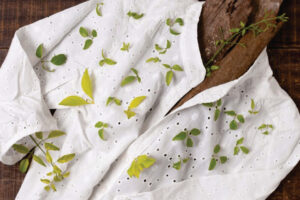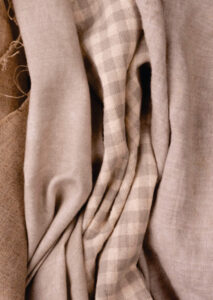Selecting sustainable and skin-friendly fabrics is crucial for a healthier planet and personal well-being. Many textiles contribute to pollution, while others may cause skin irritation due to harsh chemical treatments. Learning about eco-friendly and skin-safe fabrics empowers consumers to make informed choices. This guide explores the best materials that promote both comfort and environmental responsibility.

Why Choose Eco-Friendly and Skin-Safe Fabrics?
The textile industry has a significant environmental footprint. Many synthetic fabrics contain harmful chemicals that not only pollute ecosystems but also cause discomfort and allergic reactions. Opting for eco-friendly and skin-safe fabrics reduces pollution and supports healthier lifestyles.
1. Lower Environmental Impact
Traditional fabric production consumes excessive amounts of water and chemicals. Sustainable alternatives help conserve resources and reduce harmful waste, making the fashion industry more responsible.
2. Hypoallergenic and Breathable
Synthetic textiles can trap heat and moisture, leading to discomfort or skin irritation. Natural fibers provide better air circulation, reducing the risk of allergic reactions and improving comfort.
3. Ethical and Sustainable Production
Eco-conscious fabrics often come from brands that prioritize ethical labor practices, responsible farming, and biodegradable materials. Choosing these fabrics supports sustainability and fair trade.
Best Natural Fabrics for Comfort and Sustainability
Natural fibers break down faster than synthetic materials, making them a better choice for the environment. They are also gentler on the skin, offering superior comfort.
1. Organic Cotton: Soft, Breathable, and Free of Chemicals
Organic cotton is cultivated without synthetic pesticides or fertilizers, making it safer for both the environment and individuals with sensitive skin. Unlike conventional cotton, organic varieties help maintain soil health and reduce water contamination. This fabric is lightweight, breathable, and suitable for everyday wear, bedding, and baby clothes.
2. Linen: Strong, Lightweight, and Sustainable
Linen, derived from flax, requires far less water than traditional cotton. Its natural antibacterial properties make it an excellent fabric for people with sensitive skin. Over time, linen softens while retaining its durability, making it a long-lasting and sustainable choice. It is especially useful in warm climates due to its moisture-wicking abilities.
3. Hemp: Antibacterial, Durable, and Eco-Conscious
Hemp is one of the most sustainable and durable textiles available. It grows quickly with minimal water and requires no pesticides. Its antibacterial nature prevents odor buildup, and it provides natural UV protection, making it ideal for outdoor wear. Additionally, it blends well with other fibers to create softer, more flexible fabrics without losing sustainability benefits.
4. Tencel (Lyocell): A Modern Eco-Friendly Fabric
Tencel, derived from responsibly sourced wood pulp, is biodegradable and produced using a closed-loop system that minimizes waste. It is exceptionally smooth, moisture-wicking, and gentle on the skin, making it a top choice for activewear, undergarments, and comfortable everyday clothing.
5. Bamboo Fabric: Cooling, Hypoallergenic, and Antibacterial
It grows rapidly without requiring pesticides, making it a highly sustainable material. Bamboo fabric is breathable, moisture-absorbing, and naturally antibacterial, reducing odor buildup. However, it is essential to choose bamboo lyocell over chemically treated bamboo rayon, as the latter undergoes processing with toxic substances that can harm both workers and the environment.

Innovative and Recycled Sustainable Fabrics
New fabric innovations and recycling technologies allow the fashion industry to reduce waste and promote a circular economy.
1. Recycled Cotton: Reducing Textile Waste and Water Use
Recycled cotton gives a second life to old fabric scraps, reducing the need for virgin cotton production. This sustainable option conserves water and energy while maintaining the softness and breathability of traditional cotton.
2. Piñatex: A Plant-Based Leather Alternative
Piñatex is a vegan, biodegradable leather substitute made from discarded pineapple leaves. It offers a cruelty-free, sustainable alternative to traditional leather while eliminating the need for toxic tanning chemicals.
3. Econyl: Repurposed Nylon That Cleans Up the Oceans
Econyl is a regenerated nylon fiber made from discarded fishing nets and industrial plastic waste. It helps clean up the environment while providing a strong, durable fabric suitable for swimwear and activewear.
4. Wool: A Renewable and Biodegradable Insulator

Ethically sourced wool is a renewable and long-lasting fabric with excellent insulation properties. Choosing wool from humane and sustainable farms ensures that it remains an ethical option.
Fabrics to Avoid: Harmful to the Environment and Skin
Some widely used textiles contribute to pollution and can cause skin irritation due to synthetic treatments and chemicals. Avoiding these materials leads to a more sustainable and skin-friendly wardrobe.
1. Polyester: A Major Contributor to Microplastic Pollution
Polyester is a petroleum-based fabric that sheds microplastics into waterways when washed. These tiny fibers pollute oceans and harm marine life.
2. Conventional Cotton: Resource-Intensive and Chemically Treated
Regular cotton farming consumes excessive amounts of water and relies on pesticides, leading to soil degradation and long-term environmental harm.
3. Rayon (Viscose): Chemically Intensive Production
Rayon is derived from wood pulp but undergoes heavy chemical processing that releases toxic waste into water systems, causing environmental damage.
4. Acrylic: Non-Biodegradable and Skin-Irritating
Acrylic is petroleum-based and often contains residual chemicals from manufacturing, making it one of the least eco-friendly and least skin-friendly materials available.
How to Identify the Best Eco-Friendly and Skin-Safe Fabrics
Being mindful of fabric choices ensures better environmental and personal well-being. Here are some key factors to look for when shopping sustainably.
1. Look for Reliable Certifications
Certifications such as GOTS (Global Organic Textile Standard), OEKO-TEX, and Fair Trade indicate that a fabric meets ethical and environmental production standards.
2. Choose Natural or Recycled Materials
Opting for organic cotton, hemp, linen, or recycled fabrics minimizes environmental harm and limits chemical exposure.
3. Avoid Synthetic Blends
Blended fabrics, which mix natural and synthetic fibers, are difficult to recycle and often contain residual chemicals from processing.
4. Support Brands Committed to Sustainability
Researching a company’s transparency about sourcing, production, and labor conditions ensures that your fashion choices align with sustainability goals.
The Future of Sustainable Fabrics
As the demand for sustainability grows, brands are investing in innovative textiles. Bio-fabricated materials, algae-based fabrics, and lab-grown fibers represent the next generation of eco-friendly fashion solutions. According to Sustainable Brands, companies are embracing responsible production to reduce their ecological impact.
Choosing eco-friendly and skin-safe fabrics benefits both people and the planet. Natural and recycled textiles provide durability, breathability, and ethical value. Avoiding synthetic materials and supporting sustainable brands leads to healthier skin and a lower environmental footprint. Every small decision contributes to a more responsible and eco-conscious future in fashion.
Sustainable Fashion Myths: Uncovering the Truth Behind Marketing Claims
Vintage and Second-Hand: Why It’s Trendy and Eco-Friendly

I’m Victoria, the creator behind Eva My Balance. Passionate about beauty, wellness, sustainable living, and mindful self-care. My mission is to inspire you to live consciously and beautifully—inside and out.



